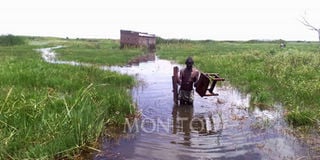Prime
Dokolo residents live in dire conditions after shocking floods

A man stands in the area invaded by water from Lake Kwania in Okwongodul Sub-county, Dokolo District. PHOTO | BILL OKETCH
What you need to know:
- The disaster has displaced thousands of people, and destroyed farmlands and critical infrastructure, driving humanitarian needs
Thousands of people in Dokolo are living in dire conditions after severe flooding triggered by rising water levels on Lake Kwania left a trail of devastation in the northern district.
The disaster has displaced thousands of people, and destroyed farmlands and critical infrastructure, driving humanitarian needs.
Official statistics from the district show that a total of 15, 152 households are affected, and are living in dire conditions.
These include; 5,357 in Agwata Town Council, 4,350 in Kwera sub-county, 2,400 in Adeknino sub-county, 1,220 in Agwata sub-county, 955 in Okwongodul, and 870 in Adok sub-county.
Local leaders and residents say the disaster has blocked access to social services such as markets, schools and health centres.
At Bata Island, for instance, pupils have to remove their school uniforms and wade through the flooded section of the road naked with their school clothes above their heads. Men and women now use two pairs of clothes to go to the local markets through the flooded roads.
Meanwhile, women have reported that they are now suffering from urinary tract infections because of wading through the flooded water with barely any clothes on them.
Dr Rosemary Alwoc Ogwal, a resident of Adok sub-county, said the situation has been ongoing for a long time but it is now getting to a crisis point.

Residents fetch flooded water in Amuk Village, Awelo Parish in Adeknino Sub-county, Dokolo District, on April 13, 2024. PHOTO | JULIUS OCEN
“We have lost farmland and the main house to floods, we don’t know how we are going to survive after this,” she said.
Farmers interviewed by this publication say that circumstances have forced them to sell their cows and other animals because they have nowhere left to graze them
“We have made quick sales at extremely low prices. This is a painful blow to someone who has already lost their home and livelihood to the floods,” Dr Alwoc Ogwal said in an interview on Thursday.
Mr Fredrick Ogwal Owiny, Adeknino LC3 chairman, said 17 out of the 42 villages in his sub-county have been affected by the disaster.
“Flooding has affected pupils’ access to Abalang Primary School, while families with sick relatives cannot access Awelo Health Centre III,” he said.

Mr Ogwal Owiny, another resident says some of the displaced people are living in rented houses, while others are staying with relatives at Awelo, Tecwao and Alik trading centres, all in Adeknino sub-county.
The Chief Administrative Officer (CAO), Mr Richard Madete, reported that on April 15, 2024, he wrote to the Office of the Prime Minister seeking immediate food relief and other basic needs.
Devastating impacts of floods
As a result of climate change, floods are becoming more frequent and intense, posing an immediate physical threat to those affected, according to the International Rescue Committee (IRC), an international humanitarian organisation.
Beyond their initial impact, floods have far-reaching consequences such as undermining food security, damaging infrastructure and displacing millions of people from their homes.
The devastating impacts of floods are long-lasting and affect vulnerable communities the most. In the last decade, communities with low levels of climate resilience (meaning, the ability of a system, community, or region to withstand the impacts of climate change) had 15 times higher mortality rates due to floods, droughts and storms.




